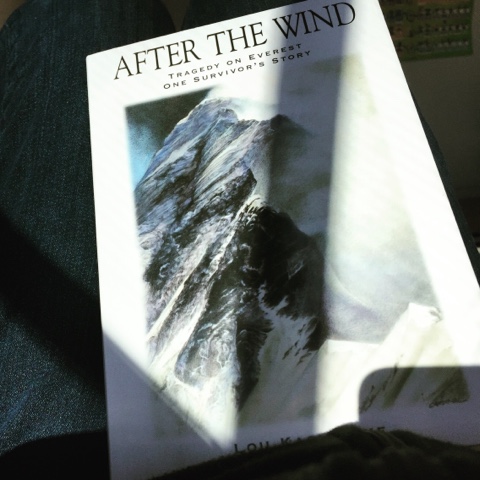Climbing Mountains
Everest made me want to re-read Jon Krakauer's book Into Thin Air, a book I read a decade and a half ago. I read it over the next two days, completely engrossed. If you have any interest in mountaineering, I recommend that you read Into Thin Air first, and then watch Everest. That way you have the underlying facts (according to Krakauer at least) and can understand what is happening in the movie. To be clear, Krakauer and many others involved in the 1996 disaster take issue with the the movie. Of course, there are other books that tell of the 1996 disaster. In response to Krakauer's book, Anatoli Boukreev, a guide for one of the expeditions summiting during that same time, wrote a book with G. Weston DeWalt entitled The Climb. I haven't read it, but I will. You will want to read it especially after reading Krakauer's postscript in his book specifically addressing Boukreev and DeWalt. The last few pages wherein he describes Boukreev and his feelings about what transpired after his Outside magazine article and book, and Boukreev's death shortly thereafter are touching and sad.
If you're interested, you should also watch the 1998 IMAX short documentary Everest, by David Breashears. It's available on Amazon and very enjoyable in a different way. What made it extremely interesting to me was the realization that Breashears was there shooting his movie while the disaster of 1996 unfolded. In fact, Breashears, Ed Viestars, and the IMAX team were directly involved in helping with the rescue of many of the people involved. It's fascinating stuff.
Other first hand accounts have been written including books by Lou Kasischke and Beck Weathers, both clients of the commercial guided expeditions, who survived the tragedy. I haven't read any of these other accounts, but I did purchase Kasischke's book and once it arrives, I'll read that too. [Update: I read Kasischke's After the Wind over the weekend. Although there was a lot of the book that was of no interest to me (he bills his book as a love story), it was enlightening to hear another perspective. I would recommend reading it as one of the other survivors from Rob Hall's expedition.]
As a person who has less than zero knowledge and/or experience in mountaineering, let it be known that my interest in these books and movies is not in the details of whether using supplemental oxygen to climb Everest is a good thing or bad, for instance. I wouldn't know enough to weigh in on that debate. I am, however, interested in the policies surrounding access to Everest and other mountains like K2. To read about the trash, and bodies, left on Everest is eye-opening. I also find the Sherpa community, the culture of the Nepalese and Tibetans, and their relationships with climbers extremely interesting. [As an aside, I watched the documentary The Summit about the 2008 tragedy on K2 on Netflix. In the film, one of the Sherpas said that he was forced to go back on the mountain despite treacherous conditions and exhaustion to try and save some climbers. He said that they had been paid money and so the climbers thought they owned their lives. So powerful.]
Above all of this, the thing of real interest in all of these accounts is, as it always is the case, human nature. For those of us who have never summitted any mountain let alone the 7 highest mountains of all 7 continents, it's beyond interesting to try and understand the psychology of someone who would voluntarily endure such incredible hardship and pain in order to climb a mountain. I came away from it with at least some understanding of why this would be appealing, how one could put the fear of death aside, and how lonely yet exhilerating such an endeavor really is.



Comments
Post a Comment